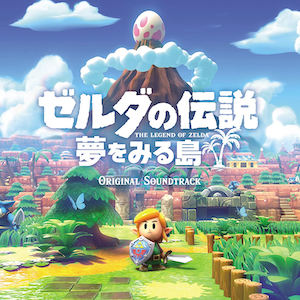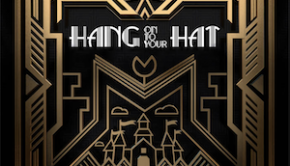The Legend of Zelda: Link’s Awakening Original Soundtrack
 |
Album Title: The Legend of Zelda: Link’s Awakening Original Soundtrack |
| Record Label: Columbia | |
| Catalog No.: COCX-41117~20 | |
| Release Date: March 18, 2020 | |
| Purchase: Buy on Amazon |
Overview
Over twenty-five years ago, composers Minako Hamano, Kozue Ishikawa, Soyo Oka, Kazumi Tokata and Koji Kondo collaborated on the soundtrack to a GameBoy game called Link’s Awakening. With a surprisingly bittersweet narrative and a legendary plot twist, The Legend of Zelda’s first handheld outing eventually became a classic; and tunes like the sentimental “Ballad of the Wind Fish” and the riveting “Tal Tal Heights” would continue to resonate with Zelda fans for decades to come.
Rediscovering the sound of a game steeped in nostalgia is no small task, even if a full-scale remake of the game calls for it. You can rescore a classic soundtrack in any number of ways, but there’s no telling whether fans – or even the original composers themselves – will embrace the changes. (Just check out Koji Kondo and Mahito Yokota’s “upending of the tea table” discussion in their Ocarina of Time 3D Iwata Asks interview.)
Yet last year’s Link’s Awakening remake for the Switch was such a drastic departure in the visual department that a freshly arranged soundtrack made perfect sense. This task fell to Ryo Nagamatsu, the composer who infused previous Zelda titles like A Link Between Worlds and Tri Force Heroes with a traditional folk sound rooted in passionate acoustic performances. Nagamatsu-san did wonders for these previous outings; but how does his trademark sound lend itself to the tunes of Link’s Awakening, and is the soundtrack itself sufficiently strong to support Nagamatsu-san’s efforts?
Body
Comparisons between Link’s Awakening’s original and remade soundtracks won’t be difficult to draw, because the four disc CD set released in March contains both. Each version spans two discs, and aside from tunes exclusive to either version, their tracklists are mostly identical.
1) The Original Soundtrack (Discs 3 & 4)
Thanks to the team Nintendo assembled back in the day, that tracklist packs a few of The Legend of Zelda’s most charming compositions. “Exploration for the First Time” greeted players back in the day with a mirthful promise of fresh adventures, while the mystical “Owl” theme enticed players to delve further into the secrets of Koholint Island. As players journeyed across the island itself, the accompanying music could range anywhere from creepy and tense (“Mysterious Forest”) to epic and daring (“Tal Tal Heights”). Yet more often than not, players traveled to the tune of a playful take on the iconic Zelda overworld theme (“Field”); and no matter where on the island their journeys took them, they could always look forward to returning to Mabe Village for a sweet, simple town theme.
The music of Link’s Awakening was delightful, and often quirky. For every endearing melody (“Mr. Write’s House”, “Richard’s Villa”, “House by the Bay”), you could expect something dissonant (“Frog’s Song of Soul”), calamitous (“BowWow Rescue Mission”) or otherwise whimsical and odd (“Shop”). Some tunes achieved comic effect by imitation: “Tarin, Chased by Bees” played out like a fleeting homage to Rimsky-Korsakov’s “Flight of the Bumblebee”, while “Telephone Booth” emulated the sonic experience of dialing a number into a phone and letting it ring. Despite its brevity, the Link’s Awakening soundtrack had no shortage of character – not to mention a plethora of musical cues and fanfares, and a handful of odd easter eggs (the “Hidden BGM” tracks).
Two themes were particularly important to the narrative. First, there was the cartoonishly eerie “Cave” motif, whose key components resurfaced in several of the soundtrack’s dungeon themes (and even the mini-boss battle theme).
Second, there was “Ballad of the Wind Fish”.
If you know Link’s Awakening, you’ve heard it. Marin sang it. Link played it on Ocarina. It accompanied a heartfelt moment the two of them shared together on shoreline. Each Instrument of the Sirens played a fragment of it, and eventually they all assembled and played it in unison. It was referenced with a sense of foreboding at a pivotal plot moment in “Southern Face Shrine”, and it even played a role in the climactic final battle track. “Ballad of the Wind Fish” was the heart and soul of the Links Awakening soundtrack: a simple, wistful tune that tugged players’ heartstrings in the game’s finale.
As an in-game listening experience, the soundtrack worked: it helped solidify Link’s Awakening’s status as an endearing Zelda entry, and certain tracks even found their way into the Oracle of Seasons / Ages duology later on. As a standalone soundtrack, on the other hand, Link’s Awakening is a listening experience largely littered with extraneous musical cues and, occasionally, particularly shrill timbres (even considering its chiptune constraints). But the soundtrack set encompasses every snippet of Link’s Awakening music a fan could hope for, and the tunes that made the game a legend worth its namesake still shine in their original form.
The real question is whether, and how, Ryo Nagamatsu’s renditions of these tunes could do the soundtrack justice.
2) The Remake Soundtrack (Discs 1 & 2)
Nagamatsu-san’s Zelda soundtracks are, in a word, tactile. He gravitates toward folk, chamber, and orchestral styles, and each instrument in the mix sparkles thanks to crisp recordings and uncluttered arrangements. Nagamatsu’s work on Link’s Awakening boasts the same strenghts. Whether it’s the scratches and squeals of a string quartet, the low growl of a bassoon, or the versatile taps and clacks produced by variety of percussive tools, little timbral details make each track precious.
What’s most fascinating is the way that Nagamatsu-san injects fresh material into the original compositions without overwriting their original character. The new “Name Entry” splits the original melody into pieces that the winds trade between each other, and then begins modulating and introducing staccato chiptune elements. Previously skeletal tracks like “Cave”, “Boss Battle Victory Heart Get” and “Ballad of the Wind Fish (Coast Ver.)” now come full bodied thanks to additional string padding. Some tracks, like “Owl” and “Tal Tal Heights”, are even reprised with added drama in follow-up tracks that were never present on the original soundtrack. Other tunes, on occasion, stretch to double – or even quadruple – their original length to make room for additional instrumentation switch-ups. “Mabe Village” is the best example of this, packing six different permutations comprising a music box, strings, clarinet and ocarina in various combinations before looping back to the beginning.
For some tracks, the conversion to HD is enough by itself. Hearing Link’s ocarina tunes performed on an actual ocarina is a delight; and so, too, is getting to hear the “Instrument of the Sirens” fanfares on their actual respective instruments (with one or two exceptions: “Thunder Drum”, for example, merely recycles the chiptune beat of the original with wonky reverb). In both cases, the articulation is charming. The quirky tracks are quirkier than ever, too: the “Animal Village” melody now features transposed samples of cats and dogs, “Telephone Booth” adds heavily processed vocal samples, and “Frog’s Song of Soul” now packs a bubbly beat and a warbling chorus that could have come straight out of Splatoon.
Marin’s vocal version of “Ballad of the Wind Fish” gets the smartest treatment of all. For one matter, it now features an actual vocalist. Moreover, where the original melody was nigh impractical to sing given its range, the remake edition transposes the second half of the melody down an octave to make it manageable. The melody still sits near the peak of the vocalist’s range, but it’s handled with grace and never gets grating.
Nagamatsu-san’s retooling of the Link’s Awakening soundtrack works so well that, if anything, it’s hard not to wish he and his team had gone even further with it. The new soundtrack is faithful to the old to a fault. The trouble is this: in meeting the constraints of the GameBoy, the original tracks often passed in a flash. Even those that stretched beyond a minute and a half often felt like they could have used more compositional development, even if it would have been implausible for the time. The remake works wonders in terms of texture and sound, but it rarely takes the creative liberties that would have resolved this issue. In the wake of remakes like Fire Emblem Echoes: Shadows of Valentia, which introduced and elaborately expanded upon an entirely new musical theme, some listeners may be disappointed by the lack of new thematic material.
But that’s not to say the Link’s Awakening remake lacks new music. In fact, there are several brand new additions, from the spacey and mysterious “Seashell Mansion” to a couple of playful new tracks for the fishing and river rafting minigames. There are a handful of new “item get” fanfares to differentiate in-game collectables, and there’s even a suite of flute-centric “Marin Versions” of various overworld themes. The final boss suite now has a new movement specific to the “Final Form” phase, with the same briskly paced drumbeat you’d find in The Wind Waker’s “Molgera” battle theme. Not too long after comes “The Wind Fish Appears” – an ethereal, heartbreaking string track that instills awe and tears in equal measure.
The “Chamber Dungeon” suite is especially cool. “Dampé’s House” mixes a wormy synth and bassoons into an earthy blend, while “Chamber Dungeon – Edit Mode” playfully weaves together fragments of “Ballad of the Wind Fish” and the Zelda overworld theme. The dungeon tracks themselves revolve around a playful and menacing theme, with each subsequent track escalating the instrumentation and tension; and capping off the suite is a victory track with a peppy swing and a slightly medieval flare.
The best new addition by far is the “TV Commercial Version” of “Ballad of the Wind Fish”. You can practically hear Marin yearning to fly in Ichiko Aoba’s vocals, and the soft, piano-driven arrangement and melancholic chord progression compliment her beautifully.
Summary
For a soundtrack that delivers almost four hours’ worth of content in two unique flavors, Link’s Awakening is a surprisingly light affair. Certain tunes, like “Ballad of the Wind Fish”, are fan-favorites for a reason, but the rest might elude even the most diehard Zelda fan’s memory. But the underlying score is pleasant, if sometimes downright silly, and the way Ryo Nagamatsu and crew have reimagined it is generally magical. It only took a quarter of a century to put together, but for anyone looking for an official and comprehensive collection of Link’s Awakening music, there you are.
Do you agree with the review and score? Let us know in the comments below!
3.5
Posted on July 1, 2020 by Reilly Farrell. Last modified on September 13, 2020.














